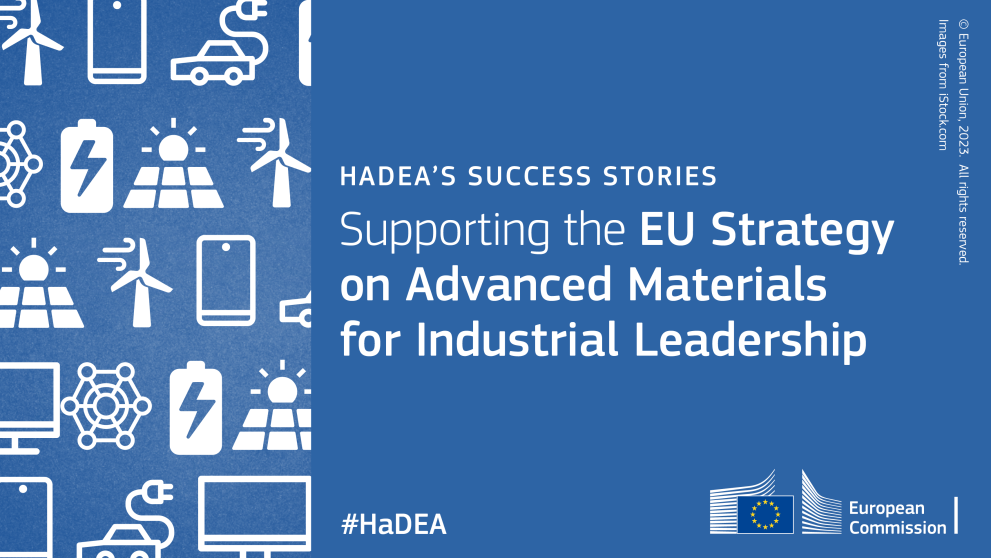
On 27 February 2024, the European Commission adopted the Communication on Advanced Materials for Industrial Leadership. The Communication proposes an encompassing strategy to move towards EU industrial leadership in advanced materials, a key enabling technology highly relevant for the twin green and digital transition. It puts forward concrete steps to align research and innovation priorities and investments in the EU.
Discover some of HaDEA’s successful projects:
- NanoSolveIT is working to effectively assess the risks of nanomaterials. The project introduced a ground-breaking in silico Integrated Approach to Testing and Assessment (IATA) for the environmental health and safety of nanomaterials. It is implemented as a decision support system, packaged as a standalone open software and a Cloud platform.
- PANBioRA provides a comprehensive solution for the time and cost-effective risk assessment of new biomaterials under health or disease states, or of a given biomaterial for each patient in a personalised manner. PANBioRA provides a modular platform to assess risks at different aspects and length scales: antibody response, cytotoxicity/genotoxicity at cell level, systemic and local effects at tissue and connected tissues (organ-on-a-chip) level. Its value was proven during the COVID epidemy, when it allowed the development of pertinent antiviral coatings with patent applications.
- DACOMAT contributed to the development of more damage tolerant and damage predictable low-cost composite materials for use in large load carrying constructions like bridges, buildings, wind-turbine blades, and offshore structures. The developed materials and condition-monitoring solutions enable large composite structures to be designed and manufactured which are defect tolerant and reduce the need for manual inspection.
- Switch2save explored active management of radiation energy transfer through glass-based building envelopes by integrating transparent energy smart materials with switchable total energy transmission values. The project developed Insulating Glass Units, with electrochromic and thermochromic technologies. The Switch2save solution reduced energy demand by letting sunlight in on cool days and blocking it on hot days.
- DECOAT proposed a solution to ensure the circular use of textiles and plastic parts with (multilayer) coatings that are difficult to recycle. This was achieved through the development of triggerable smart polymer material systems and appropriate recycling processes. The triggerable solutions are based on smart additives like microcapsules or microwave triggered additives, demonstrated at a recycling pilot plant.
- Repair3D developed innovative reclamation and repurposing routes for end-of-life plastic and carbon fibre reinforced polymer (CFRP) components. This was achieved by integrating advanced nanotechnology solutions, additive manufacturing, and recycled resources, to produce high added value 3D printed products with advanced functionalities, contributing to a new paradigm of a distributed recycling process.
Background
The recommended actions of the Strategy on Advanced Materials for Industrial Leadership will pave the way for:
- a more coordinated and responsive European ecosystem for advanced materials leveraging public and private investments in strategic areas;
- new economic opportunities for EU companies relying on these critical technologies or willing to test them in their innovation process; and
- a larger-scale and more rapid deployment of advanced materials as market catalysts for the twin transition, reinforcing EU resilience and open strategic autonomy.
Horizon 2020 was the EU’s multiannual funding programme between 2014 and 2020. H2020 provided Research and Innovation (R&I) funding for multi-national collaboration projects alongside individual researchers and SMEs via special funding instruments. Horizon 2020 is succeeded by the Horizon Europe Programme, which will run until 2027.
Details
- Publication date
- 1 March 2024
- Author
- European Health and Digital Executive Agency
- Programme Sector
- Industry
- Programme
- Horizon Europe
- Horizon Europe Cluster 4: Industry
- Tags
- EUFunded
- Innovation
- Raw material
